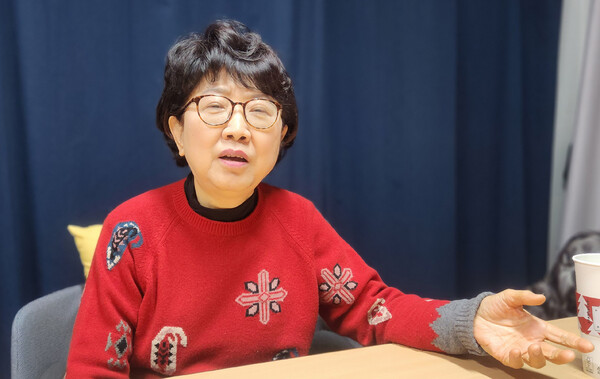“Politics is ruining Korea’s healthcare.”
Former lawmaker Park In-sook said so, describing the current situation where healthcare has emerged as a social issue. Park, who once jumped into politics and served as a two-term legislator, is a pediatrician and the best-known pediatric cardiologist.
Park pointed out that the political community is exploiting the problems of Korean healthcare as a “vote-gathering strategy” instead of trying to solve them fundamentally, resulting in even more serious problems.
A case in point is establishing new medical schools. First, politicians have called for establishing more medical colleges, followed by civic groups and the government. Finally, provincial and municipal administrations have jumped into a fray to attract medical schools “that have no substance yet.” South Jeolla Province is even running a TV commercial.
"Politicians use new medical schools as if they were a ‘cure-all,’ creating an illusion among the public,” Park said.
New medical schools do not solve healthcare problems in their regions, and nothing showed this better than the now-defunct Seonam College of Medicine. The mushrooming of new medical schools will only produce the victims of poor education. Seonam College of Medicine opened its door in 1995 but was labeled as a “poor medical school” until closing its door in 2018.
Park said it is better to invest the money to establish new medical schools to replenish regional medical infrastructure. In an interview with Korea Biomedical Review, she said, “It’s astonishing that there’s still talk about the establishment of new medical schools.”
Park graduated from Seoul National University College of Medicine and served as an assistant professor at the Department of Pediatric Cardiology at the Baylor College of Medicine, the University of Houston, and the Texas Cardiology Hospital. She returned to Korea in 1989 and worked as a professor of the Pediatric and Adolescent Cardiology Department at Asan Medical Center. She became the first woman to serve as the dean of Ulsan University College of Medicine. Her book “Congenital Heart Defects” is regarded as a textbook by congenital cardiologists. In addition, Park worked as a lawmaker at the 19th and 20th National Assembly, representing the Songpa A precinct.

Question: Twelve bills on new medical schools have been submitted to the National Assembly, and local governments are competing fiercely to draw medical schools.
Answer: I hope they stop talking about establishing new or public medical schools. However, they will keep discussing this as long as there are parliamentary elections. Campaign pledges to set up medical schools in their regions lead to votes. Will new medical schools improve the regional healthcare environment? The answer is no, as shown by Seonam College of Medicine. It is better to invest financial resources in new medical schools for developing regional public medical institutions. Even if they establish new medical schools, the number of doctors does not increase in the regions immediately. However, if they spend the money needed for new medical schools on replenishing medical personnel and facilities, they can see its effects in a year or two.
Q: Aside from medical manpower shortage, they call for establishing new medical schools for various reasons, including the training of physician-scientists.
A: Politicians have created an illusion that new medical schools would resolve all problems. They say as if new medical schools were a cure-all. They say the nation should foster doctors who will work in the field to strengthen public healthcare. However, look at the reality, and you will see how absurd such allegations are. It’s not that only doctors do not want to work at provincial hospitals. Patients, too, don’t want to visit there. If lawmakers fall ill, do they visit local hospitals in their precincts? No. They visit Seoul National University Hospital. Then, they say new medical schools will strengthen public healthcare and improve regional medical infrastructure.
Q: Recently, reports about provincial hospitals that cannot find doctors even if they offer yearly salaries of up to 400 million won ($309,000) made headlines. Some criticize doctors for acting like “fat cats.” Others cite workforce shortage as the reason for increasing the number of doctors.
A: There are reasons doctors don’t go to hospitals offering handsome salaries. One of them is doctors cannot make the most of their specialties in provincial hospitals as patients visiting there don’t have a variety of diseases. In addition, the doctors don’t feel rewarded in an environment where they cannot use what they have learned hard. A work environment dominated by government employees and labor unions is another reason doctors avoid such institutions.
many regions set up new hospitals while complaining about the shortage of doctors. This is because establishing new medical institutions can be an accomplishment for these elected officials. However, they don’t care even if the newly established hospitals run poorly. Instead of trying to change the medical environment by resolving fundamental problems, they want to use the issue only for political purposes.

‘Make sure pediatricians do not leave medical fields’
Park lamented that “cracks” are heard throughout the medical system, but no proper solutions are found. Parents with sick children rush to hospitals at opening and closing hours every day. However, many pediatricians experience severe operational difficulties that they seriously consider “shutting down.” Also, there are fewer and fewer applicants to specialize in pediatrics.
She pointed out that pediatrics illustrate the crisis facing Korea’s medical sector, criticizing the government’s shortsighted policy focusing only on the increase in the “number of doctors.”
biggest reason medical school graduates do not choose pediatric department is they can see no future in this area,” Park said. The same can be said about other areas of essential care. If the increase in enrollment quota fails to guarantee a “bright future,” few graduates will apply for it. Throughout the interview, Park stressed that “revolutionary ideas and shocking measures” are needed to solve the current situation.
Q: There are fewer and fewer doctors wanting to specialize in pediatrics. Only 33 applied for pediatrics among medical residents for the first half of 2023.
A: As a person devoted to children’s treatment for life, the current situation is very regrettable. And, on the other hand, I feel angry. It is difficult to solve the problem if the government puts forth only shortsighted solutions aimed at increasing the recruitment rate of the departments of pediatrics and adolescents. Because of the low birthrate, the number of patients itself has fallen, making it difficult for the treatment of children to produce revenues. Children’s hospitals cannot sustain themselves only by treating children. In large hospitals, too, pediatrics departments rank low in revenue with fewer incentives than doctors at other departments.
These days, there are no pediatric hospitals that treat only children. They also treat adult patients and offer various other services, such as chiropractic, development, and speech therapies. These hospitals create new revenue channels because they cannot sustain themselves only by treating children. On the one hand, parents wait hours to treat their children. On the other, pediatric hospitals close their doors. The problem seems to be getting increasingly difficult to solve. Medical school graduates do not choose pediatrics because they can see no future there. We must ensure those who have chosen this field do not leave it.
Q: In detailed majors, the pediatric fields are also being avoided.
A: Reimbursement should be strengthened mainly for severe diseases that are high-risk and difficult to treat, but the government’s policies are not going this way. The reality is that a pediatric cardiologist treats general children patients at university hospitals. It’s because there are not many pediatric heart patients in every university hospital. Mergers and acquisitions are also needed. Not all university hospitals need to have pediatric cardiologists. The government must think about ways to gather specialists in different regions by creating more centers. For this to happen, the medical community should drop vested interests and coordinate opinions.
Q: The government also has put forth measures to improve the pediatric treatment system and is checking its implementation. What do you think is the most necessary measure?
A: All ends up in reimbursement. Pediatric treatment fees should also go up. Many people should participate in the treatment of one child. Children are different from adult patients. Pediatric treatment is more difficult and requires greater caution. However, there are no additional reimbursements for treating children patients. Differentiated reimbursements according to children’s age can be one way. The younger the children, the harder the treatment.
It may sound absurd, but a revolutionary and shocking step is necessary, like giving 100 million as congratulatory money to every physician who obtains a license as a pediatric specialist. Revolutionary ideas are needed. The situation requires nothing less.
Q: What advice will you give medical school students as prospective doctors?
A: I hope there will be an environment where I can advise them to specialize in pediatrics. Can parents actively recommend their sons and daughters attend medical colleges specializing in essential care, including pediatrics? I just want them to see more broadly and further forward. I want them to live as they please and without regrets. I hope the establishment provides institutional support for them to choose specialties and engage in them without regrets.
Related articles
- ‘Medically advanced Korea lags in pediatric intensive care’
- PICUs vital for reducing mortality in critically ill children, yet facing shrinking numbers
- 'Seoul National University Children's Hospital to expand global outreach of Korea's pediatric care expertise'
- Over 700 pediatricians flock to learn lucrative cosmetics biz
- ‘Increase medical school enrollment quota by reducing oriental doctors’

